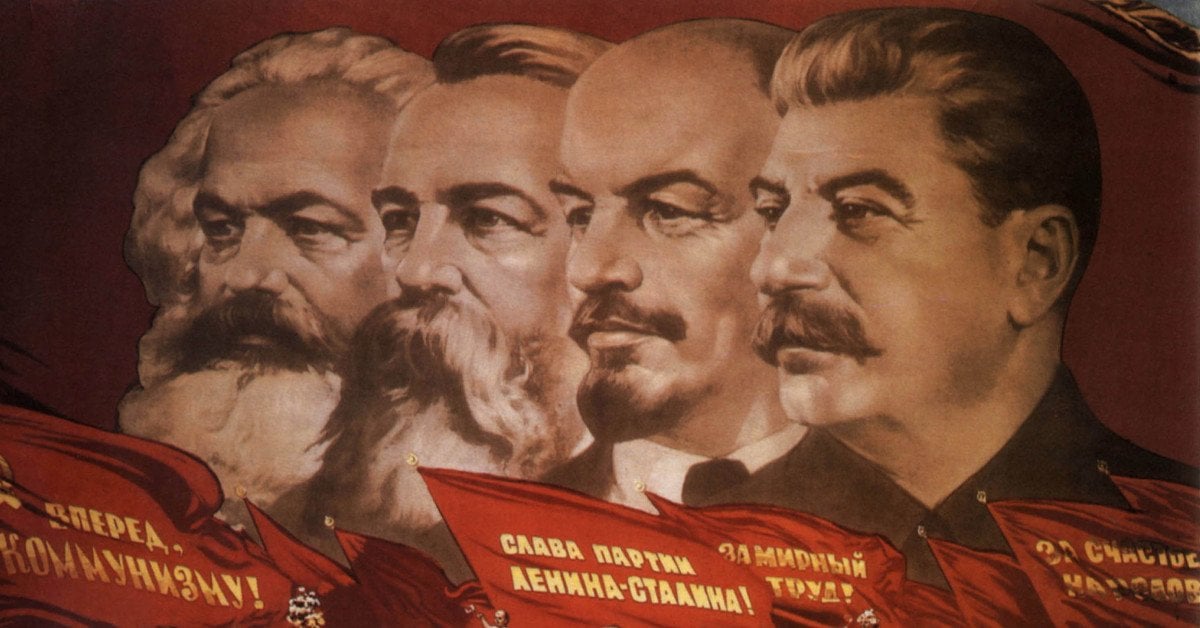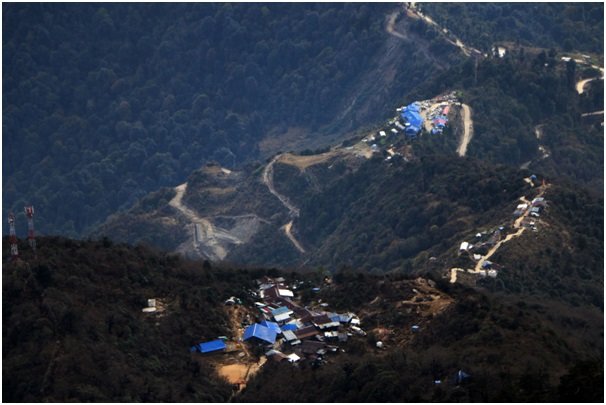All about communism
There are several reasons why communism in Nepal has failed to deliver on its goals..

Communism is a political and economic ideology that advocates for the abolition of private property and the establishment of a classless, equitable society. Communism is based on the idea that the means of production, such as factories, land, and resources, should be owned and controlled collectively, rather than by individuals or private businesses.
According to communist theory, capitalism, which is based on the private ownership of the means of production, is inherently exploitative and leads to social and economic inequality. In a communist society, the goal is to eliminate this exploitation and inequality by establishing a system in which everyone works according to their abilities and receives what they need according to their needs.
Communism has been implemented in various countries around the world, including the Soviet Union, China, Cuba, and North Korea. However, the history of communism has been marked by both successes and failures, and the ideology remains controversial and debated to this day. Critics of communism argue that it leads to economic inefficiency and the suppression of individual freedom, while supporters argue that it holds the key to a more equitable and just society.
Communist Theories In Nutshell
Communist theories are a set of ideas that outline a vision for a socialist or communist society and provide a framework for the implementation of socialist or communist policies. These theories are based on the belief that capitalism, which is based on the private ownership of the means of production, is inherently exploitative and leads to social and economic inequality.
One of the key figures in the development of communist theory is Karl Marx, who developed the theory of socialism, which argued that the proletariat, or working class, should lead the revolution to overthrow the capitalist system and establish a socialist society. Marx believed that socialism, which would involve the collective ownership of the means of production, would be more equitable and efficient than capitalism.
Other important figures in the development of communist theory include Friedrich Engels, who was a key collaborator in the development of Marxist theory, and Vladimir Lenin, who implemented socialist policies in Russia after the Russian Revolution of 1917. Lenin and his successors, such as Joseph Stalin, focused on rapid industrialization and collectivization in order to build a socialist society in the Soviet Union.
Other communist leaders, such as Mao Zedong in China and Kim Il-sung in North Korea, developed their own versions of socialism, known as Maoism and Juche, respectively. These theories emphasized the role of peasants in the socialist revolution and the importance of continuous class struggle.
Overall, communist theories provide a framework for the development of socialist or communist societies and have played a significant role in shaping world history. However, the implementation of these theories has been marked by both successes and failures, and the ideology remains controversial and debated to this day.
Communist Leaders & Their Work
Karl Marx, Friedrich Engels, Vladimir Lenin, Joseph Stalin, Mao Zedong, Kim Il-sung, Ho Chi Minh, Fidel Castro, Che Guevara, Pol Pot, Nicolae Ceaușescu, Enver Hoxha, Salvador Allende, Erich Honecker, and Todor Zhivkov were all communist leaders who played a significant role in the development and implementation of socialist or communist ideologies in their respective countries.
Friedrich Engels (Germany)
Vladimir Lenin (Russia)
Joseph Stalin (Russia)
Mao Zedong (China)
Kim Il-sung (North Korea)
Ho Chi Minh (Vietnam)
Fidel Castro (Cuba)
Che Guevara (Argentina)
Pol Pot (Cambodia)
Nicolae Ceaușescu (Romania)
Enver Hoxha (Albania)
Salvador Allende (Chile)
Erich Honecker (East Germany)
Todor Zhivkov (Bulgaria)
Karl Marx and Friedrich Engels are considered two of the founders of communist theory. Marx, a philosopher and economist, is best known for his theory of socialism, which argued that capitalism is inherently exploitative and that the working class, or proletariat, should lead the revolution to overthrow the capitalist system and establish a socialist society. Engels was a key collaborator in the development of Marxist theory and is known for his contributions to the idea of socialism.
Vladimir Lenin and Joseph Stalin were two prominent communist leaders who implemented socialist policies in Russia and the Soviet Union. Lenin played a key role in the Russian Revolution of 1917 and was a Marxist who implemented socialist policies in Russia after the revolution. Stalin, who took over as leader of the Soviet Union after Lenin's death, was also a Marxist and implemented policies such as rapid industrialization and collectivization in order to build a socialist society in the Soviet Union.
Mao Zedong was the leader of the Chinese Communist Party and the first Chairman of the People's Republic of China. Mao implemented a version of socialism in China known as "Maoism" or "Marxism-Leninism-Mao Zedong Thought," which emphasized the role of peasants in the socialist revolution and the importance of continuous class struggle. Mao also implemented policies such as land reform and collectivization in order to build a socialist society in China.
Kim Il-sung was the leader of North Korea from 1948 until his death in 1994. Kim implemented a version of socialism in North Korea known as "Juche," which emphasized self-reliance and the central role of the state in guiding the economy and society. Under Kim, North Korea pursued policies such as central planning and collectivization in order to build a socialist society.
Ho Chi Minh was the leader of Vietnam and played a key role in the Vietnamese Revolution of 1945. Ho was a Marxist and implemented socialist policies in Vietnam after the revolution, including land reform, collectivization, and industrialization. Ho's version of socialism emphasized the role of the peasants in the socialist revolution and the importance of building a strong and independent Vietnam.
Fidel Castro was the leader of Cuba from 1959 until his retirement in 2008. Castro was a Marxist and implemented socialist policies in Cuba, including land reform and the nationalization of key industries. Castro's socialist policies helped to improve the lives of many poor and marginalized people in Cuba, but they also led to economic challenges and the suppression of political opposition.
Che Guevara was an Argentine revolutionary and politician who played a key role in the Cuban Revolution of 1959. Guevara was a Marxist and believed in the idea of socialism. Guevara is known for his efforts to spread revolution to other countries and his contributions to the development of Marxist theory.
Pol Pot, Nicolae Ceaușescu, Enver Hoxha, Salvador Allende, Erich Honecker, and Todor Zhivkov were all communist leaders who implemented somewhat native socialist policies in their respective countries. However, they also had many differences and similarities in their philosophy, achievements, and failures.
One similarity between these leaders is that they were all influenced by Marxist theory and believed in the idea of socialism. They also all implemented policies such as land reform, collectivization, and industrialization in order to build socialist societies in their countries.
However, there were also significant differences in the way these leaders interpreted and applied Marxist theory. For example, Pol Pot and Enver Hoxha implemented more radical versions of socialism that emphasized the role of the state in guiding the economy and society, and often used violence and repression to achieve their goals. In contrast, Salvador Allende and Todor Zhivkov implemented more moderate versions of socialism that focused on building more equitable and industrialized societies through gradual reform.
Another difference between these leaders was in their achievements and failures. Some of these leaders, such as Erich Honecker and Todor Zhivkov, were able to achieve significant economic and social improvements in their countries. However, others, such as Pol Pot and Nicolae Ceaușescu, were known for their widespread atrocities and human rights abuses, which led to widespread suffering and death in their countries.
Overall, while these communist leaders shared a belief in the idea of socialism, they had many differences in their philosophy, achievements, and failures. Some leaders were able to achieve significant economic and social improvements in their countries, while others were known for their authoritarianism and repression.
Timeline of Key Event In Communism
Here is a timeline of key events in the history of communism:
1848 - The Communist Manifesto, a book written by Karl Marx and Friedrich Engels, is published, outlining the theory of socialism and the need for a socialist revolution to overthrow the capitalist system.
1917 - The Russian Revolution occurs, leading to the establishment of the Soviet Union as the first socialist state.
1919 - The Communist Party of China is founded.
1924 - Joseph Stalin becomes the leader of the Soviet Union after the death of Vladimir Lenin.
1949 - The People's Republic of China is established after the Chinese Communist Party defeats the Nationalist Party in the Chinese Civil War.
1950 - The Korean War begins, with North Korea, supported by the Soviet Union and China, fighting against South Korea, supported by the United States.
1959 - Fidel Castro leads the Cuban Revolution and establishes a socialist government in Cuba.
1960s - The Soviet Union and China experience significant economic growth and development under socialist policies.
1968 - The Prague Spring, a period of liberalization in Czechoslovakia, is suppressed by the Soviet Union and its allies.
1976 - Mao Zedong, the leader of China, dies and is succeeded by a more pragmatic leadership that begins to implement market-based economic
978 - Deng Xiaoping becomes the leader of China and begins to implement market-based economic reforms.
1989 - The Berlin Wall falls, signaling the collapse of communist regimes in Eastern Europe.
1991 - The Soviet Union collapses and is dissolved into 15 independent countries.
1997 - Hong Kong, a former British colony, is returned to China under the "one country, two systems" policy, which allows Hong Kong to maintain a separate legal and economic system.
1998 - Kim Jong-il becomes the leader of North Korea after the death of his father, Kim Il-sung.
2000s - China continues to experience rapid economic growth and development under its market-based economic reforms.
2011 - Cuba announces economic reforms to allow for more private enterprise and foreign investment.
2012 - Xi Jinping becomes the leader of China and begins to centralize power and crack down on dissent.
2019 - Protests against the government of Hong Kong begin, with protesters demanding greater democracy and autonomy from China.
2020 - The COVID-19 pandemic leads to economic downturns and political crises in many countries around the world, including China, Cuba, and Vietnam.
Timeline Of Key Events In The History Of Communism In Nepal
1920s and 1930s - The communist movement begins to emerge in Nepal, with the formation of the Nepal Mazdoor Congress in 1926 and the Nepal Praja Parishad in 1936.
1949 - The Nepal Communist Party is founded.
1959 - The Nepal Democratic Congress, a political party with communist ties, is formed.
1960s - It faces significant repression and conflict with other political parties.
1990 - The Nepali Congress and the Nepal Communist Party (Unified Marxist-Leninist) lead a popular uprising against the monarchy, leading to the establishment of a multi-party democracy in Nepal.
1996-2006 - A civil war breaks out in Nepal between the government and the Communist Party of Nepal (Maoist), leading to the deaths of thousands of people.
2006 - The civil war ends with the signing of the Comprehensive Peace Agreement, which allows the Communist Party of Nepal (Maoist) to participate in parliamentary politics.
2008 - The Constituent Assembly of Nepal is formed to draft a new constitution for the country.
2015 - Nepal adopts a new constitution, establishing the country as a federal democratic republic.
2018 - The Communist Party of Nepal (Unified Marxist-Leninist) and the Nepal Communist Party (Maoist Center) merge to form the Nepal Communist Party, which becomes the largest party in the Parliament of Nepal.
2022 - Clash between CPN UML and Moaist Center comes to a resolution and forms a government out of blue.
Communism in Nepal vs Rest of The World
Communism in Nepal has had many similarities and differences compared to communism in other parts of the world.
One similarity is that It, like in other parts of the world, has been influenced by Marxist theory and has advocated for the establishment of a socialist society based on common ownership of the means of production. The Nepal Communist Party and the Communist Party of Nepal (Maoist) have both sought to implement socialist policies in Nepal, including land reform and collectivization.
However, there have also been significant differences in the way communism has developed in Nepal compared to other parts of the world. For example, It has faced significant repression and conflict with other political parties, leading to the civil war in Nepal from 1996 to 2006. In contrast, communist movements in other parts of the world, such as in the Soviet Union and China, were able to take power and establish socialist states.
Another difference is in the economic policies implemented by communist parties in Nepal compared to other parts of the world. The Nepal Communist Party has implemented more moderate economic policies, including a mixed economy with both private and public ownership of the means of production. In contrast, communist parties in other parts of the world, such as in the Soviet Union and China, have implemented more radical economic policies, including rapid industrialization and collectivization.
Overall, while It shares some similarities with communism in other parts of the world, there have also been significant differences in the way communism has developed and been implemented in Nepal.
Why The Communist Movement In Nepal Failed To Deliver ?
There are several reasons why communism in Nepal has failed to deliver on its goals..
It has faced significant resistance and opposition from other political parties and actors, which has hindered its ability to implement its policies and achieve its goals. This resistance and opposition has often come in the form of violent conflict, such as the civil war in Nepal from 1996 to 2006, which resulted in the deaths of thousands of people. The communist movement has also faced significant repression and persecution, with many communist leaders and activists being imprisoned or forced into exile. The resistance and opposition faced by It has made it difficult for the movement to maintain political power and influence and to implement its policies effectively.
It has not had a clear vision or strategy for building a socialist society, leading to confusion and inconsistency in its policies and actions. This lack of clarity and consistency has made it difficult for the communist movement to build a coherent and cohesive agenda and to gain the support and confidence of the Nepali people. The communist movement has also struggled to adapt to changing circumstances and challenges, leading to a lack of flexibility and adaptability.
It has struggled to address the diverse and complex needs and interests of the Nepali people, leading to widespread disillusionment and disillusionment with the movement. The Nepali people are a diverse and culturally rich society, with a wide range of social, economic, and political interests and concerns. The communist movement has struggled to effectively address and incorporate these diverse needs and interests into its policies and actions, leading to a lack of widespread support and buy-in from the public.
It has not been able to effectively mobilize and organize the working class and other marginalized groups, leading to a lack of popular support for its policies and goals. The working class and other marginalized groups, such as women, ethnic minorities, and disadvantaged communities, have often been at the forefront of It.
he communist movement in Nepal has been unable to provide effective leadership and direction, leading to a lack of unity and cohesion within the movement. It has been marked by significant internal divisions and conflicts, which have undermined its ability to present a united and cohesive front to the public. These divisions and conflicts have often been based on ideological differences, personal rivalries, and regional and ethnic tensions. The lack of effective leadership and direction within the communist movement has made it difficult for the movement to maintain its focus and coherence and to achieve its goals.
It has not been able to overcome the legacy of colonialism and imperialism, which have shaped Nepal's political and economic development and continue to influence the country's direction. Nepal has a long history of foreign domination and exploitation, which has left a lasting impact on the country's political and economic institutions and culture. It has struggled to effectively challenge and overcome this legacy and to build a truly independent and sovereign socialist society.
It has faced significant economic challenges, including a lack of resources and infrastructure, which have hindered its ability to implement its policies and achieve its goals. Nepal is a poor and underdeveloped country, with a weak and fragile economy. The communist movement has struggled to effectively address these economic challenges and to build a strong and sustainable socialist economy.
It has struggled to deal with the complexities and challenges of building a socialist society in a diverse and culturally rich country like Nepal. Nepal is a diverse and culturally rich country, with a wide range of social, economic, and political interests and concerns. The communist movement has struggled to effectively address and incorporate these diverse needs and interests into its policies and actions, leading to a lack of widespread support and buy-in from the public.
It has not been able to effectively address the issue of corruption and mismanagement, which have undermined the credibility and legitimacy of the movement. Corruption and mismanagement have long been a problem in Nepal, and the communist movement has struggled to effectively address this issue and to build a transparent and accountable socialist society.
It has not been able to effectively engage with and integrate the concerns and perspectives of marginalized groups, such as women, ethnic minorities, and disadvantaged communities. It has often focused on the interests of the working class and has struggled to effectively address the needs and concerns of marginalized groups. This has led to a lack of inclusivity and diversity within the movement and has undermined its ability to build a truly equitable and inclusive socialist society.
It has not been able to effectively address the challenges of globalization and the changing global political and economic environment, leading to a lack of adaptability and flexibility.
It has not been able to effectively communicate and engage with the public, leading to a lack of transparency and accountability. It has often struggled to effectively communicate its policies and actions to the public, leading to a lack of understanding and support for its goals. This lack of transparency and accountability has also contributed to the perception that the communist movement is opaque and secretive, further undermining its credibility and legitimacy.
It has faced significant external challenges, including the influence of foreign powers and the interference of external actors, which have hindered its ability to implement its policies and achieve its goals. Nepal is a small and vulnerable country, and it has often been the target of external interference and manipulation. It has struggled to effectively address these external challenges and to protect the sovereignty and independence of the country.
It has struggled to address the issue of factionalism and infighting, which have undermined the unity and cohesion of the movement. It has been marked by significant internal divisions and conflicts, which have often been based on ideological differences, personal rivalries, and regional and ethnic tensions. These divisions and conflicts have undermined the unity and cohesion of the movement and have made it difficult for the movement to present a united and cohesive front to the public.
It has not been able to effectively address the issue of human rights and civil liberties, leading to a lack of respect for the rule of law and democratic values. Nepal has a long history of human rights abuses and violations, and the communist movement has struggled to effectively address these issues and to build a society that respects the rights and freedoms of all citizens.
It has not been able to effectively address the challenges of environmental sustainability and climate change, leading to a lack of progress in addressing these critical issues. Nepal is a country with a rich and diverse natural environment, but it is also vulnerable to the impacts of climate change. It has struggled to effectively address these environmental challenges and to build a sustainable and eco-friendly socialist society.
It has not been able to effectively address the issue of social justice and equality, leading to persistent inequalities and injustices within society. Nepal is a country with significant social and economic inequalities, and the communist movement has struggled to effectively address these inequalities and to build a more equitable and just socialist society.
It has not been able to effectively address the issue of regional and international relations, leading to a lack of engagement and cooperation with other countries and organizations. Nepal is a small and landlocked country, and it has often struggled to effectively engage with regional and international actors and to build strong and mutually beneficial relationships. It has struggled to effectively address these challenges and to build a more connected and engaged socialist society
In summary, It has faced a number of challenges and failures that have hindered its ability to deliver on its goals and to build a successful socialist society. These challenges and failures include resistance and opposition from other political parties and actors, a lack of clarity and consistency in its vision and strategy, a failure to effectively address the diverse and complex needs and interests of the Nepali people, a lack of popular support and mobilization, a lack of effective leadership and direction, a failure to overcome the legacy of colonialism and imperialism, economic challenges, difficulties in building a socialist society in a culturally rich and diverse country, problems with corruption and mismanagement, a lack of inclusivity and engagement with marginalized groups, difficulties in adapting to globalization and the changing global political and economic environment, a lack of transparency and accountability, external challenges, factionalism and infighting, problems with human rights and civil liberties, environmental challenges, and difficulties in engaging with regional and international actors.
Intersecting Point Between Capitalism And Socialism
In the context of Nepal, the intersection between capitalism and socialism can be seen in the country's history and current political and economic landscape. Nepal is a predominantly agrarian country with a history of feudalism and colonialism, and it has struggled to develop a strong and stable market economy.
During the 20th century, Nepal underwent a series of political and economic transformations, including the establishment of a constitutional monarchy and the introduction of market-oriented reforms. However, these reforms have been accompanied by significant challenges and inequalities, including widespread poverty, social unrest, and environmental degradation.
In response to these challenges, the communist movement in Nepal has emerged as a major political force, advocating for a more socialist and inclusive economic system. The communist movement has called for greater state intervention and regulation of the economy, as well as redistributive policies and programs to address social and economic inequalities.
However, the communist movement in Nepal has faced significant resistance and opposition from other political parties and actors, and it has struggled to effectively implement its policies and achieve its goals. The intersection between capitalism and socialism in Nepal has therefore been marked by ongoing debates and conflicts over the role of the state, private property, markets, and wealth and income distribution.
There are several intersections between capitalism and socialism in general, as these two economic systems have different but overlapping characteristics.
One intersection between capitalism and socialism is the role of the state. In both systems, the state plays a role in regulating and influencing the economy, though the extent and nature of this role differs. In capitalism, the state is typically seen as having a limited role, with a focus on protecting private property and enforcing contracts. In socialism, the state plays a more active role in planning and directing the economy, with a focus on meeting the needs of the people.
Another intersection between capitalism and socialism is the role of private property. In capitalism, private property is seen as a fundamental right and the basis of economic activity. In socialism, private property is seen as a source of inequality and exploitation, and it may be limited or abolished altogether. However, even in socialist societies, private property may still exist in some form, such as in the form of personal possessions or worker-owned cooperatives.
A third intersection between capitalism and socialism is the role of markets. In capitalism, markets play a central role in allocating resources and determining prices. In socialism, markets may still exist, but they may be subject to greater regulation and planning by the state. In some socialist societies, markets may be entirely replaced by central planning or other forms of resource allocation.
A fourth intersection between capitalism and socialism is the distribution of wealth and income. In capitalism, wealth and income are typically distributed based on market forces, such as supply and demand. In socialism, wealth and income may be more equally distributed through redistributive policies, such as progressive taxation and social welfare programs. However, even in socialist societies, there may still be significant inequalities in wealth and income, depending on the specific policies and practices in place.






Leave Comment